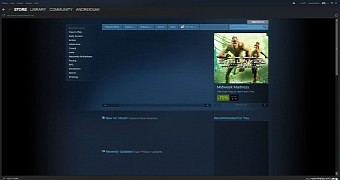Recently, a developer has reacted poorly to some issues with the Steam launch of its title, Paranautical Activity, and chose to threaten Valve leader Gabe Newell with death, which resulted in the elimination of his title from the digital distribution service.
The game creator then apologized and said his message was not serious, but it’s highly unlikely that his game will be allowed back on Steam in the future.
A discussion quickly sprang up involving the limits that should exist on the power of Valve and how important free speech is to game developers, especially when there’s no intention of following up on threats made under stress.
Steam is close to becoming a monopoly
Steam is the dominating digital distribution service on the PC, despite being in competition with the likes of GreenManGaming, Origin, uPlay, and other niche services, and there are many users who tend to use the word monopoly when referring to it.
Technically, Valve is not actually a monopoly and is not regulated as such by any government, but nevertheless some believe it should try to voluntarily place some limits on its actions.
Many economists currently talk about tech companies, like Amazon and Google, as benevolent monopolies, a category that relies on the direct support of the public in order to dominate a segment of the market.
If they do anything to antagonize customers, they can be quickly toppled by a competitor that has similar technical capabilities, which means that they cannot actually use their power in abusive ways.
Steam is a behemoth because it runs big sales, has a large variety of indie games offered, and gives users access to a wide array of features to improve their experience, from Family Sharing to trading cards, which are positives for the community and the industry.
If Valve would ban certain video games based on unclear reasons or would choose to drop the products of one company without explanation, it is likely that many users would initially protest and might then drop Steam altogether.
The limits of free speech
Mike Maulbeck, the creator of Paranautical Activity, had no right to threaten Gabe Newell, even if he was annoyed by the way his release was treated by Valve, but he has since apologized and explained his actions.
Free speech is important, but it cannot be used to make threats acceptable, especially when they target personalities who have less privacy protections than others.
The company has the right to sever all ties with Maulbeck, but it would certainly impress many gamers if it chose to bring the game back to Steam in a few weeks, while offering a clearer explanation for its actions.
At the same time, Valve can communicate better about its processes and rules, while making sure that indie titles are treated the same way as those coming from big publishers.
A benevolent monopoly can do a lot of good if it chooses to tackle a certain topic and if it uses its considerable audience and resources in order to educate rather than directly punish.
Valve is a company that many see as the savior of gaming on the PC and its future depends on building and maintaining a community that works together despite its differences.

 14 DAY TRIAL //
14 DAY TRIAL // 



